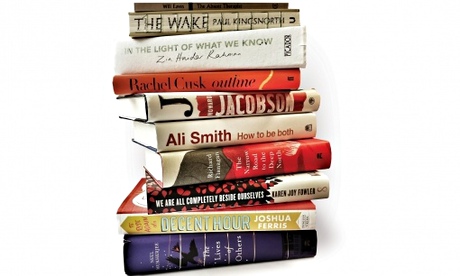
I was all fired up for the announcement of the 2014 Goldsmiths prize: an award dedicated to creative daring and experimental fiction, a prize set up partly in response to the Booker prize’s infamous year of readability. Last year’s shortlist was incredible, a real celebration of cutting-edge fiction, with the judges surpassing themselves when they selected A Girl is a Half-formed Thing as the winner, giving Eimear McBride her first big nod.
This year, it feels different. Just when you think you’re about to see a set of daring books, you see … well, more of the same. With three of this year’s Goldsmiths shortlist already longlisted for the Booker prize, it’s hard to see how Goldsmiths’ search for the “qualities of creative daring” is any different from the Booker’s aspiration to find the “best, eligible full-length novel”. Some might argue that this can only be good news, a sign that three of the “best” books written in English are also the most “daring”. But when these prizes start to blur together, you start to wonder whether there’s any point to literary awards.
But book prizes are extremely important, especially for writers. My debut, Coconut Unlimited, was a novel about a subject publishers considered niche – hip-hop – and brought out by a small independent press. Getting shortlisted for the 2010 Costa first novel award was the best thing that ever happened to it, creating an awareness for the book, giving it a scope beyond anything I’d imagined.
I was the Booktrust web editor at the time, looking after the digital side of awards such as the Orange prize, the Sunday Times short story award and the John Llewellyn Rhys prize. I got to see what being shortlisted for those prizes meant for those authors, in terms of exposure, validation and – let’s be honest – cash. When Kevin Barry won the Sunday Times award in 2012, he spoke frankly about how the prize money “kept the wolf from the door”.
Writing’s tough. Being able to afford to write for a living is nigh on impossible. I have a day job mentoring young people at an online magazine, which is brilliant and worthy, but as I type this, I know it’s taking away the time I have to work on my third novel. For authors, book prizes are absolutely vital. They put our books in readers’ hands, they keep the wolf from the door, and they’re all about celebration.
So why does the Goldsmiths prize shortlist feel so flat? There are awards for sports books, awards for books that are funny, even an award for the book with the oddest title. So why do our major literary prizes feel like they’re covering the same old ground?
I’m not ashamed of getting excited about literary awards, I don’t mind admitting that I scan the lists to look for new books to buy. So I’m disappointed to discover that despite the vast quantity of brilliant fiction published over the last year, the same few books are in contention for all the literary prizes.
What’s the point of a book prize again?

